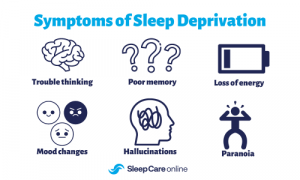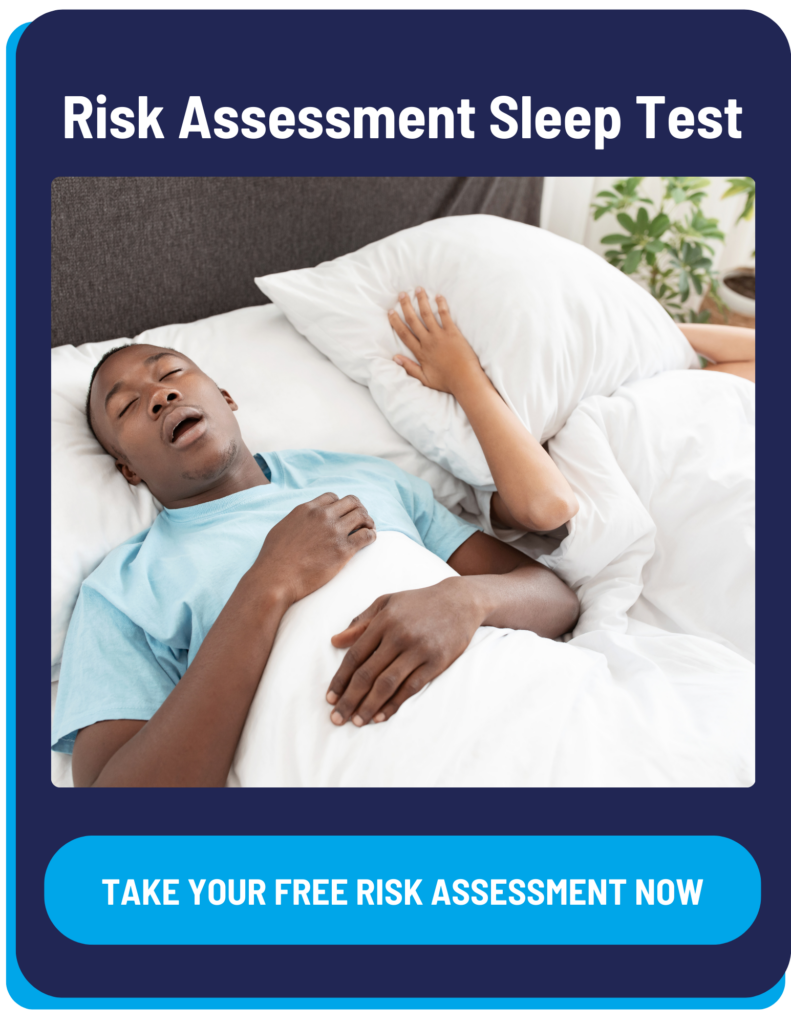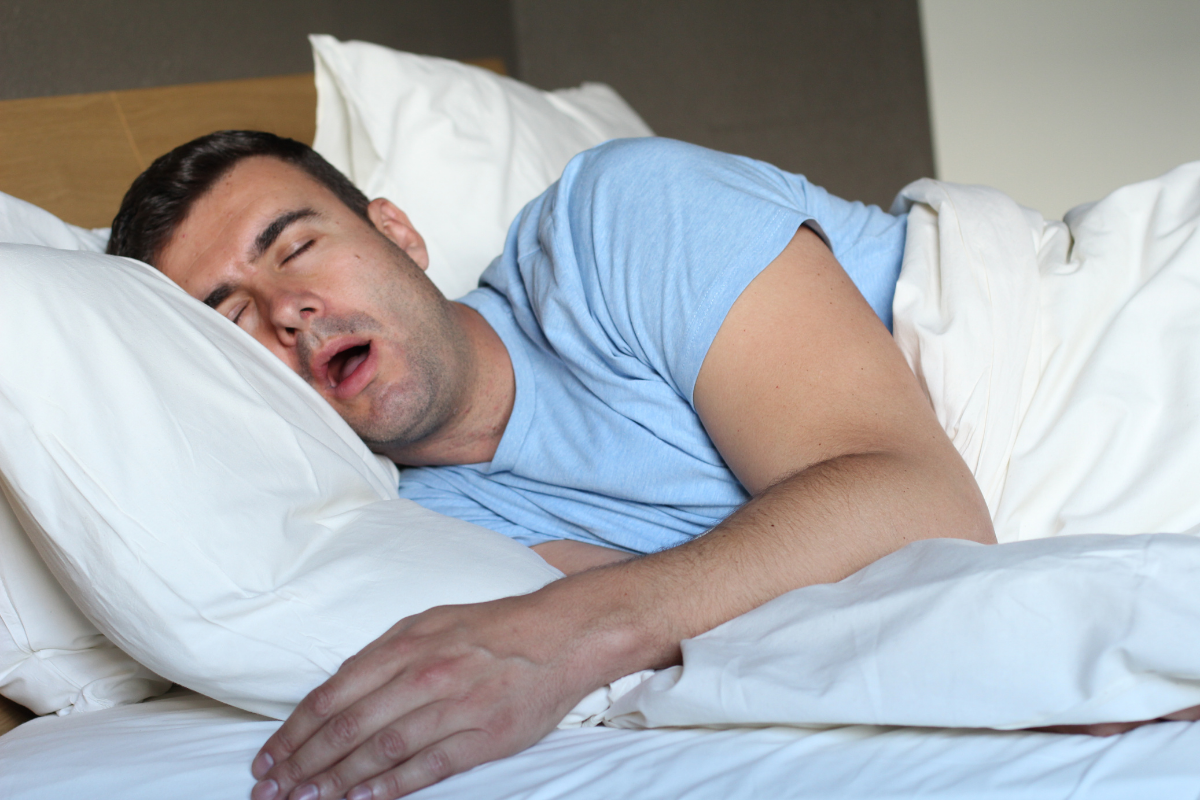
According to a recent poll from the National Sleep Foundation, approximately 50% of adults report feeling sleepy three days a week or more.1 This sleep deprivation may often lead to irritability, mood swings, and a general feeling of being unwell. While these side effects are short-term and may resolve themselves with a few nights of proper sleep, continued sleep deprivation may contribute to long-lasting health complications.
What Are the Various Types of Sleep Deprivation?
Types of sleep deprivation include:
- Obstructive Sleep Apnea
- Insomnia
- REM Sleep Disorder
- Narcolepsy
- Restless Leg Syndrome
Sleep Deprivation vs Insomnia
Insomnia is not sleep deprivation. Sleep deprivation is a loss of sleep due to personal or work habits. For example, you can become sleep-deprived due to an erratic work schedule. Insomnia is the inability to go to sleep even when you have the opportunity. Insomnia is usually related to stress or anxiety preventing normal sleep.
Why Does Sleep Deprivation Affect You?
When you’re sleep deprived, you are not getting the proper of amount sleep for your body to function. This results in an impact on your natural circadian rhythm, and several systems in your body, and can even negatively affect your response time, coordination, and more.
What Are The Complications Of Sleep Deprivation?
Sleep deprivation has many complications including the following:
- Mood swings
- Weight change
- Immune dysfunction
- Hormone level fluctuation
- Changes in blood sugar, blood pressure, heart rate, and more
Common Sleep Deprivation Symptoms
Sleep deprivation can show itself in everyday life:
- Difficulty with clear thinking
- Poor memory
- Reduced attention span
- Loss of energy
- Mood changes
- Hallucinations
- Paranoia
Sleep Deprivation Symptoms in Adults
Adults with sleep deprivation may experience:
- Slowed thinking
- Reduced attention span
- Worsened memory
- Poor or risky decision-making
- Lack of energy
- Mood changes including feelings of stress, anxiety, or irritability
It is not uncommon for adults to disregard the symptoms of sleep deprivation. Erratic work schedules, raising children, and other life events can seem to take priority over sleep health. But sleep deprivation symptoms can begin to impact daily life both mentally and physically if ignored.
Sleep Deprivation Symptoms in Children
Children may show similar signs of sleep deprivation as adults, but other symptoms specific to children may arise including:
- Problems paying attention
- Hyperactivity and impulsiveness (especially in younger children)
- Low energy
- Poor mood regulation (often upset and “moody”)
- Decreased social skills
- Falling asleep at school and sleeping during short car rides
Often behavioral issues in children are sleep deprivation related. Also, sleep needs change with age. The typical amounts of sleep kids need in 24 hours decreases over time.
Long-Term Effects of Sleep Deprivation
Here are just a few of the ways that chronic sleep deprivation can negatively impact your body and its health.
High Blood Pressure
Adequate sleep helps your body recharge by balancing hormone levels. Cortisol, or the stress hormone, plays an important role in several functions, including the sleep-wake cycle and blood pressure regulation.2 If the sleep-wake cycle is compromised, cortisol levels fluctuate, which could result in an increased risk of high blood pressure.
Diabetes
Another hormone regulated by sleep is insulin. Insulin allows our bodies to properly absorb sugar from food.3 Chronic lack of sleep impairs insulin’s ability to do its job, which can cause blood sugar levels to rise. Paired with poor diet and exercise, this could ultimately lead to Type 2 diabetes.
Weakened Immunity
Sleep and immune health go hand-in-hand. According to one study, continued lack of sleep can increase the production of immune cells called cytokines. While these cells generally help your body fend off viruses and bacteria, overproduction of them can leave you defenseless, even against the common cold.4
Heart Disease
Extended periods of sleep deprivation throw several bodily functions off balance. An example is the overproduction of cortisol and cytokines; increased levels of both have been linked with an increased risk of cardiovascular disease.1,4
Weight Gain
There are several reasons as to how or why someone may gain weight. Ghrelin and leptin are the hormones that signal the body’s hunger and fullness cues, respectively. During sleep deprivation, ghrelin levels are increased while leptin levels are decreased. This leaves you feeling hungrier and less full.5 This eventually leads to overeating and weight gain.
Side Effects of Sleep Deprivation
In addition to the long-term side effects listed above, sleep deprivation can cause several other side effects that impact your daily life. These include:
- Chronic headaches
- Mood swings and irritability
- Lack of concentration or focus
- Forgetfulness
- Excessive fatigue
Causes of Sleep Deprivation
Chronic sleep deprivation is a serious issue. The good news is that it is treatable. In many cases, individuals simply need to create and adhere to a routine when it comes to sleeping. We recently published a list of sleep health tips to improve the quality of one’s sleep. If you still find yourself struggling with adequate sleep, it is important to be tested for more severe sleep disorders.
Some of the major reasons for sleep deprivation are:
Obstructive Sleep Apnea
Obstructive sleep apnea is the most common sleep-related breathing disorder. It causes you to repeatedly stop and start breathing while you sleep.
There are several types of sleep apnea, but the most common is obstructive sleep apnea. This type of apnea occurs when your throat muscles intermittently relax and block your airway during sleep. A noticeable sign of obstructive sleep apnea is snoring.
Treatments for obstructive sleep apnea are available. One treatment involves using a device that uses positive pressure to keep your airway open while you sleep.
Insomnia
Insomnia is a common sleep disorder that can make it hard to fall asleep, hard to stay asleep or cause you to wake up too early and not be able to get back to sleep. You may still feel tired when you wake up. Insomnia can sap not only your energy level and mood but also your health, work performance, and quality of life. How much sleep is enough varies from person to person, but most adults need seven to eight hours a night.
REM Sleep Disorder
Rapid eye movement (REM) sleep behavior disorder is a sleep disorder where a person can make sudden body movements or vocal sounds while they are experiencing vivid dreams during REM sleep. This disorder is in response to violent dreams which can result in a person kicking, punching, shouting, and other actions while they are asleep.
This is not typical for people to do while they are in REM sleep. REM is a normal stage of sleep where a person wouldn’t move much at all. This stage occurs mostly during the second half of the night and is the time most people dream.
Narcolepsy
Narcolepsy is a chronic sleep disorder that can give someone the sudden urge to sleep. It can also cause daytime sleepiness/drowsiness and could result in loss of muscle movement (referred to as cataplexy) and hallucinations. A person who suffers from narcolepsy could find it challenging to stay awake for long periods, no matter where they are or what time it is. Although considered rare, this sleep disorder can cause frequent and challenging disruptions in a person’s everyday life.
There are two types of narcolepsy: one accompanied by cataplexy, and the other that occurs without it. Cataplexy refers to the sudden loss of muscle tone caused by strong or intense emotions, such as laughter, anger, or surprise.
Restless Leg Syndrome
Restless legs syndrome (RLS) is a condition that causes an uncontrollable urge to move the legs, usually because of an uncomfortable sensation. It typically happens in the evening or nighttime hours when you’re sitting or lying down. Moving about eases the unpleasant feeling temporarily. Restless legs syndrome, also known as Willis-Ekbom disease, can begin at any age and generally worsens as you age. It can disrupt sleep, which interferes with daily activities.
How Much Sleep Is the Primary Requirement?
For Children
Sleep needs change as children age, usually decreasing in the number of hours needed.
- Infants (4 to 12 months): 12 to 16 hours (including naps)
- Toddlers (1 to 2 years): 11 to 14 hours (including naps)
- Preschoolers (3 to 5 years): 10 to 13 hours (including naps)
- School-aged children (6 to 12 years): 9 to 12 hours
Teenagers
By adolescence, which is considered the age range of 13 to 18 years of age, only 8 to 10 hours of sleep is required. Many adolescents fail to even get this sufficient amount of sleep, which can account for drowsiness during the day, irritability often blamed on the age group, and even in some cases depression.
Adults
Most adults only require 7 or more hours of sleep each night. It is important that it is more than just the amount of sleep that matters, but also the quality of sleep that is experienced. As adults age, they may also require more hours of sleep and are more likely to wake often at night.
Tips for Better Sleep
To improve the overall quality of sleep there are some things many people can do.
Try to keep a consistent sleep schedule. By keeping your bedtime the same every night your body adjusts accordingly and becomes ready for sleep at that specified time.
Avoid alcohol before bedtime. Nightcaps may seem to help sleep, but they actually disrupt the normal sleep cycle. Stay away from alcohol for at least a few hours before bedtime.
Avoid blue light devices before bedtime. TVs, computers, phones, and tablets all radiate blue light, which can trick the brain into thinking it is still daytime-which is time to stay awake. Close down these devices a few hours before bedtime to prepare your body for a good night’s sleep.
Avoid caffeine before bedtime. Drinking caffeine before bedtime will disrupt your typical sleeping pattern. It is recommended to avoid caffeine a few hours before bedtime so that your body can get the adequate and proper sleep it needs.
Sleep prior to deprivation. Make sure you are prioritizing the sleep your body needs so that you do not reach the point of sleep deprivation. Taking care of your overall sleep health will have positive results.
Take naps during deprivation. Although napping is not the preferred method for how to gain back lost sleep, it can help you feel more rested during the day if you are sleep deprived.
Diagnosing Sleep Disorder Leading to Sleep Deprivation
- With the Complete Care Package, schedule a 10-minute telehealth visit with a healthcare provider to discuss symptoms, upcoming sleep study, test results, and discuss treatment options.
- A multi-night, disposable home sleep apnea test is mailed to your home to be completed at your convenience.
- A physician analyzes the sleep data and provides a prescription if needed.
- Schedule an optional follow-up appointment (additional fee applies).
- We connect you to sleep experts who can offer customized sleep therapy options, assistance in equipment purchase, and initial set-up.
References:
- National Sleep Foundation. Sleep in America Poll 2020 Results. 2020 Mar. Accessed June 9, 2020.
- Breus M. Cortisol and its effects on your sleep. 2020 Mar 24. The Sleep Doctor website. Accessed June 10, 2020.
- Hess-Fischl A. What is Insulin? EndocrineWeb. 2019 May 28. Accessed June 10, 2020.
- Besedovsky L, Lange T, Born J. Sleep and immune function. Pflugers Arch. 2012;463(1):121‐137.
- Beccuti G, Pannain S. Sleep and obesity. Curr Opin Clin Nutr Metab Care. 2011;14(4):402‐412.
- American Sleep Apnea Association. Sleep Apnea Information for Clinicians. Accessed June 10, 2020.





